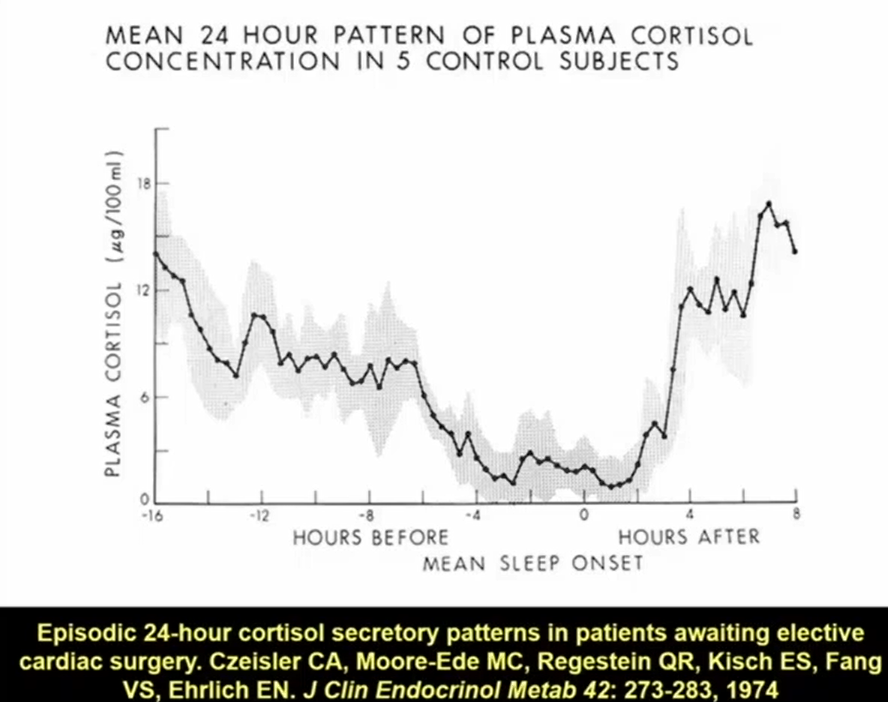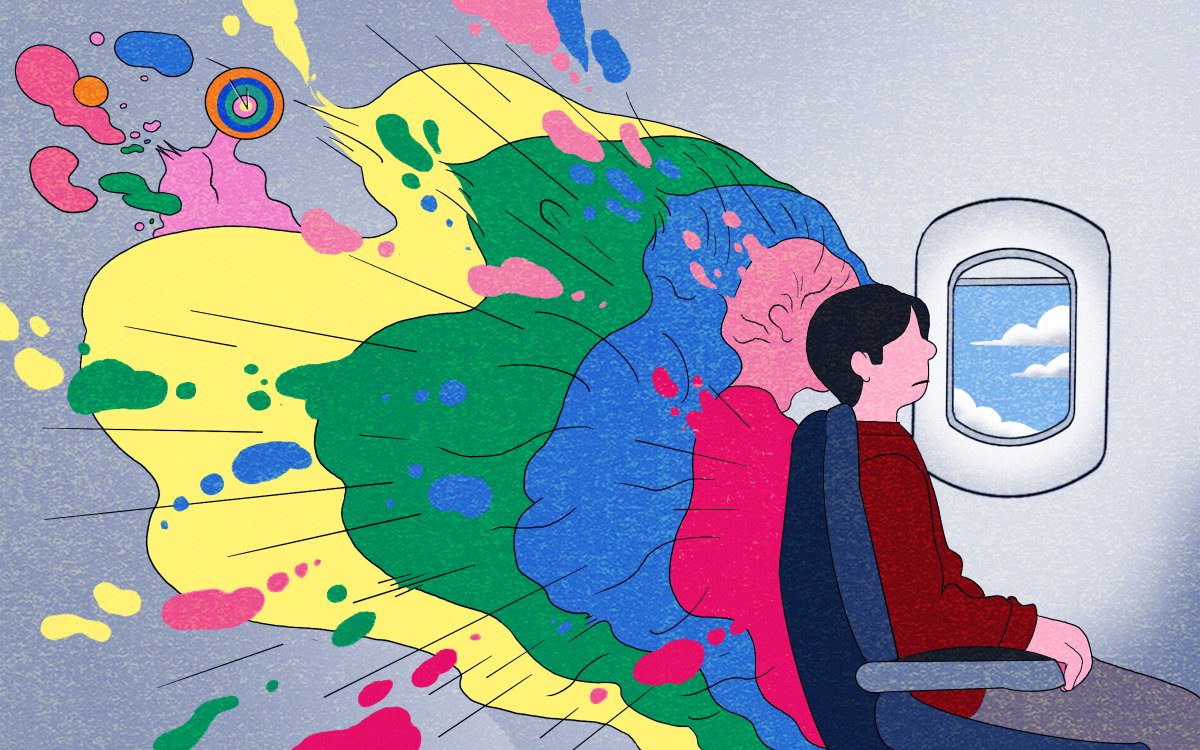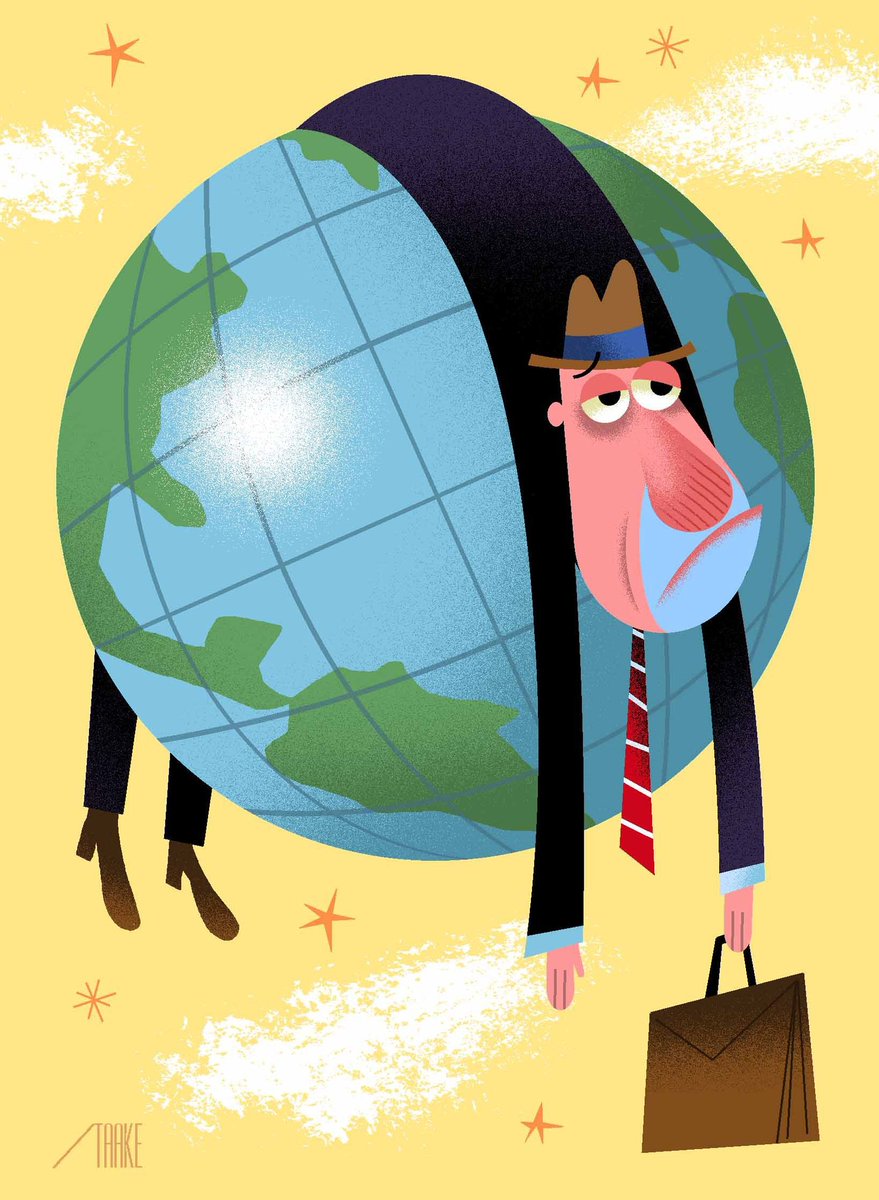
OK, in response to popular demand (n=1), here is my 🧵on managing 💤*Jet Lag*💤 posted to my main timeline! Perhaps may be helpful as we begin to stray away from our homes for the first time in over a year:
(a 🧵.... 1/45)
(a 🧵.... 1/45)
So I think the big thing that helps to understand what’s going on is that jet lag is a misalignment of your environment with your internal biological pacemaker of your body, called the circadian rhythm. (2/45) 

There are lots of functions in your body that follow a circadian rhythm - body temp, cortisol production, melatonin, immune system just to name a few. And in fact there are some processes all the way down at the cellular level that maintain a basic circadian rhythm (3/45) 

Actually pretty crazy story about how they determined this in humans, at least for body temperature. Scientists in 1905 studied a night watchman that worked nights 362 days a year, only got 3 days off a YEAR! (4/45)
They figured "hey, this dude has a very consistent reverse schedule" so they measured his body temperature thinking that if body temperature rhythm had to do with the timing of sleep and wake, then the rhythm should be flipped on its head. (5/45)
They could notice some changes bc of his night work, basically it flattened the curve a bit. BUT he was still having peak body temps during daytime and low body temps at night time, so they figured it must be constant, and never changing. (6/45)
So the going theory for the moment, at least for body temp, was that the rhythm you born with is the rhythm you die with. (7/45)
In 1906 tho (the very next year), another scientist took this new body temp technology and traveled to Manilla and measured his own body temperature, and found that in a few days, it completely shifted to the Manilla time zone. (8/45)
So his body temp was high during the Manilla day time and low during the Manilla evenings. So he was like, no y’all, body temperature can adjust just fine in new time zones, and ultimately he was right! (9/45)
What they didn’t understand with the night watchman was that the biggest driver of circadian rhythms is the light-dark cycle (more on this later). The night watchman was still exposed to the sunrise every day on his walk home, so his circadian rhythm never adjusted! (10/45)
Needless to say though, it’s really tough to disentangle which body functions are driven by circadian rhythms and which are driven by things like activity or sleep, so you got to come up with some pretty creative studies like these (11/45)
(and for you circadian rhythm stans that might see this, I do know that they discovered circadian rhythms initially in plants in 1729, don’t @ me 😂)
(12/45)
(12/45)
Another interesting tidbit is that in a vast majority of cases, our circadian rhythms aren’t exactly 24 hrs. In most cases they are a bit longer than that (on average 24 hrs and 6 min), but a smaller percentage actually has an internal rhythm that is shorter than 24 hours. (13/45
(Circadian rhythm actually gets its name from the Latin "circa," about, and "diem," a day. So, circadian rhythms are biological rhythms that occur ABOUT once a day. If it was actually 24hrs on the nose they’d probably just be called daily rhythms!) (14/45)
May not seem like much, but if something wasn’t done then your day lengths would just start drifting further and further away from 24 hours and in about 4 months you’d be going to bed at noon instead of midnight. (15/45)
This actually happens when they keep people in rooms with constant dim light and no time cues! (16/45) 

What this means is that literally EVERY DAY your body needs to reset your circadian rhythm by at least a few minutes just to keep it on time. Think of it like winding an old-timey watch. If you don’t wind it, it would start to fall out of sync and wouldn’t be on time any more. 17
Jet lag then is like putting a well-wound watch in a canon and shooting it from LA to Boston and when it lands, expecting it to give you the time in Boston. (18/45) 

What’s crazy is that we do this to ourselves voluntarily all the time. Social Jet lag is when you keep a fairly normal schedule during the week and then on the weekend you go to bed 3-5 hours later and sleep in 3-5 hours later. (19/45)
You are basically doing the same thing to your body as traveling from the west coast to the east coast in the US, and on a weekly basis! (20/45)
Interestingly social jet lag is the one thing that seems to have really improved during the pandemic (we just replicated this in a bigger sample). On average, people are staying up a bit later and waking up a bit later during the week (no morning commutes)
cell.com/current-biolog…
cell.com/current-biolog…
Also there are fewer late night weekend shin digs, so on avg there has been a pretty drastic aligning of sleep behavior (obviously the last year has sucked but people are reporting a lot of resiliency in the face of adversity and this might actually be a contributing factor) (22)
So the point of this whole thread is how do we fix jet lag? Hopefully it’s pretty clear at this point that the the primary focus should be on realigning your circadian rhythm! (23/45) 

And I say this because the most common ‘treatments’ are sleeping pills at night or stimulants to help with daytime functioning. But neither of these actually do anything to realign you. It can provide some symptom release, but it doesn’t deal with the actual underlying problem.
What does impact the circadian rhythm? The top 5 things I’d recommend: (1) Light Exposure, (2) Light Exposure, (3) LIGHT EXPOSURE, (4) gradual behavior change, and (5) melatonin (25/45)
So for 1-3, a few things feed into your circadian rhythm (meal timing, maybe exercise timing, temperature, etc) but nothing, and I mean nothing, has nearly as big of an impact on it as your exposure to light. (26/45)
Like... I cannot stress this enough, there has been research that even SECONDS of light exposure on animals or humans can have an effect on your circadian rhythm. It is that important.
(27/45)
(27/45)
🚨****So if you are already at your location, the thing that can help you adjust the quickest to the new time zone is to get BRIGHT LIGHT during the day time of the time zone you are in, and be extra cautious to AVOID LIGHT during night where you are at.****🚨
(28/45)
(28/45)
You also get ⭐️bonus points⭐️ for getting the bright light as early in the morning as possible, that will help you expedite the adjustment to the new time zone better, some research suggests in just 2-3 days.
(29/45)
(29/45)
The more you can map your light exposure to the natural light/dark cycle where you’re at, the better.
(30/45)
(30/45)
This might not sound like earth shattering news, but being proactive about it can make a big difference.
(31/45)
(31/45)
This also sets up #4, gradual behavior change. Now that you know what’s going on, before your next time zone crossing trip you can start gradually changing your light-dark exposure even 1-2 weeks ahead of time to make for an easier adjustment.
(32/45)
(32/45)
And I’m going to stress gradual here. Obviously this change will coincide with a change in sleep timing, but you don’t want to just up and go to bed an hour earlier than usual from one day to the next. (33/45)
Chances are you won’t be able to sleep anyway (and this can actually promote insomnia, but I’ll save that for another thread) (34/45)
Instead you might move your bedtime 10-15 minutes earlier or later (depending on the direction you are going to be traveling), and the more you can move your rhythm ahead of time, the less work you’ll have to do once you get there! (35/45)
And guess what y’all, there's an APP for that! Called Entrain, you can enter your flight information and the app will tell you what are the time you should get light, be in dark, etc., and I think it can start the process in advance to make it easier! entrain.math.lsa.umich.edu (36)
OK #5 is melatonin and I put this last both because light is so much more effective and because people tend to take it incorrectly anyway. I’ll start with how it should be taken. (37/45)
Naturally, melatonin starts to rise in your system soon after the onset of darkness. It definitely can get artificially pushed back due to (you guessed it) light exposure. The best fix is just to put the damn screens down an hour or so before bed. (38/45) 

But if you are going to take melatonin, then taking a bolus of it 10x the amount your body naturally produces right before you crawl into bed doesn’t exactly work the way you think it will. (39/45)
If anything you might get a bit of a placebo effect and it could actually make you really groggy in the morning. Melatonin doesn’t just flip out the lights anyway, it just starts a cascade of processes that promote sleep onset EVENTUALLY (40/45)
So what you should do instead, is take a MUCH smaller dose hours before your bed time to give it some time to kick in and actually help with falling asleep without affecting next day functioning. (41/45)
Melatonin affects people differently so I think it requires a bit of personal experimentation to see what works best for you, but my recommended starting place is 1mg 2-3 hours before bed and see how it goes from there (42/45)
So for jet lag, you could combine melatonin with light exposure to potentially expedite the effects even further. And using it strategically with gradual behavioral change in the week(s) leading up to travel is a recipe for a real winner! (43/45) 

I’ll end w/ noting jet lag is a big deal for more than just feeling groggy & a bout of transient insomnia. Injuries are the leading cause of death among travelers – esp. car accidents (bc you are essentially driving in the middle of your biological night). So...uh..BE CAREFUL/ 44
So I’d definitely recommend taking these potential tips into consideration, and if you can’t then maybe think about how you can most safely set your travel plans (timing of flights, cab to hotel on arrival instead of renting a car first thing, etc)! (45/45)
@threadreaderapp
unroll 🤞
#sleeptwitter
#SleepPeeps
unroll 🤞
#sleeptwitter
#SleepPeeps
Thank you to @YNB for inspiring the thread, and @CDelawalla for encouraging the repost!
• • •
Missing some Tweet in this thread? You can try to
force a refresh




